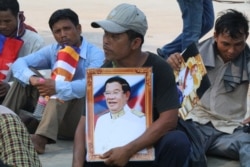In 2014, the week leading up to International Human Rights Day, grassroots communities and rights advocates were abuzz organizing events across Cambodia to mark the December 10 holiday. The event brought with it a festive atmosphere sprinkled with cautious optimism.
Monks in orange robes and communities affected by land evictions marched to Phnom Penh, often met by waiting police asking them to turn back, and indigenous groups in Ratanakkiri dressed in traditional attire and performed dances and songs to mark the occasion, many had been affected by mining concessions and hydropower dams.
The holiday marks the day the Universal Declaration of Human Rights was adopted in 1948 by the UN General Assembly. Rights advocates in Cambodia have argued that giving a public holiday allows for communities to advocate for their rights freely and collectively.
However, five years later, those same advocates are now staring at the last Human Rights Day (HRD) holiday in Cambodia. The government earlier this year said it would discontinue the holiday starting from 2020, as well as five other public holidays.
The holiday, once celebrated with gusto, has been on the decline as authorities have routinely restricted civil society from marching on December 10, and more recently increasing surveillance and security personnel presence at events held in the provinces.
Soeung Sen Karuna, senior rights officer at human rights NGO Adhoc, said December 10 was the one day communities, often ignored by authorities and in remote areas of the country, were able to voice their concerns directly to the government as a collective unit.
“These people are victims of land disputes, loss of natural resources, social injustices and abuses by the powerful,” Sen Karuna said.
“They have a chance during HRD to voice their woes, which stem from abuses by the powerful and rich, for the government to acknowledge.”
He said often the elite and authorities did not respond or fix these concerns, but that it was critical for communities to be able to continue their advocacy.
“If the government acknowledges [the abuses], they can take measures and seek justice for [communities],” he said. “However, we see that the government hasn’t acknowledged these issues, and they have even restricted gatherings on Human Rights Day.”
The government’s rationale for doing away with the holiday, incidentally, has to do with Cambodia’s deteriorating human rights record.
In February, the European Union initiated an investigation into rights abuses in Cambodia, triggered by the repressive crackdown initiated by the government against the political opposition, civil society and independent media organizations.
The government, preempting the potential suspension of the ‘Everything But Arms’ trade scheme, announced a slew of measures to deal with the potential economic ramifications, one of them being reducing the number of public holidays given in a year.
Am Sam Ath, monitoring manager for rights NGO Licadho, said given the heightened attention and monitoring by aid-giving countries on Cambodia, the removal of the rights day holiday was not great optics for the government.
“We see that nowadays the human rights situation in Cambodia is under fire from local and international for deterioration and restrictions on human rights,” he said.
“Thus, the removal of HRD as public holiday next year by the government would lead to even more criticism,” Am Sam Ath added.
But government officials have rebuked these criticisms, often saying it was needed for the national interests or that human rights protections were not solely linked to one holiday.
Cambodia Human Rights Committee member Chin Malin said the government would continue to encourage young people to mark December 10, and removal of the holiday did not mean the committee would not stop celebrating the occasion
“Respect for human rights is not only related to December 10 or whether it’s a public holiday or not. It depends on the will and implementation of [rights protections],” he said.
Government spokesperson Phay Siphan instead said the move was necessitated by economic factors, such as improving productivity in the private sector.
“One of the reasons behind this is to respond to the economic situation because the private sector requires more days of production.”
As December 10 approaches, celebrations across the country have been muted compared to just a few years ago. The Cambodia Human Rights Committee and the Office of the High Commissioner for Human Rights organized a day-long event at Olympic Stadium on Saturday.
Whereas, some civil society groups and grassroots communities are expected to conduct marches or rallies across the country on Monday and Tuesday, though they are facing stiff resistance from local authorities.
This year has also seen a number of political activists arrested for allegedly conspiring with opposition leader Sam Rainsy to orchestrate a coup during a planned return in November. Youth activists Kong Raiya and Suong Neakpoan were arrested for participating in a memorial service for slain political commentator Kem Ley.
All of these activists were released on bail by courts, again with one eye on the potential suspension of the EBA trade privileges.
Human rights advocate Phil Robertson said the move to do away with the HRD holiday was just another example of the Cambodian government’s “contempt” for human rights protections and treaties.
“This action is really a slap in the face of the Cambodian people by a government that has run roughshod over their rights for the past 35 years," said Robertson, the Deputy Asia Director for Human Rights Watch.





